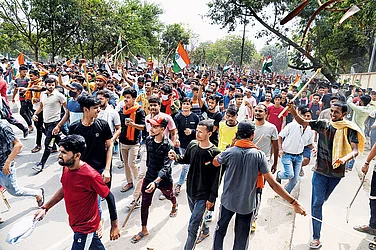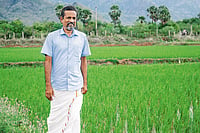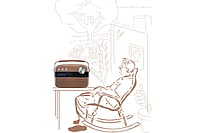One of the major B2B players that has changed the terms of the fast-moving consumer goods business is Metro Cash & Carry. From a business that was deeply in the red for 14 consecutive years, the company recently underwent a successful transition, turning into a profitable fast-growing customer-centric billion-dollar company. The man in charge of turning the comapny’s fortunes around, Arvind Mediratta, MD & CEO, speaks with Outlook Business and explains how his company became profitable without indulging in a price war that his competitors have mastered. Edited excerpts:
You come with a vast FMCG pure play experience. Now, you have successfully led a major turnaround at MCC. What do you make of the increasing dissatisfaction brewing among the distributors?
In FMCG, for the last 40-50 years, there have been certain margins that have not changed. Typically, a distributor’s margin is 5% and retailer’s margin is 10-14%. The cost of doing business and the competition, for distributors as well as the kiranas or retailers, have gone up. The expenses have gone up. Fuel prices have gone up when they do free delivery. Salaries have increased and utility costs are up. But those 5% and 10% have not changed.
If you look at FMCG companies, their profits have continued to grow at about 30-40% year-on-year. Even though their top line is flat and hardly shows volume growth, they increase prices and profits keep growing. The balance of power is in the hands of FMCG companies.
Now, with the retail sector becoming bigger and people like us, who have 10 lakh kiranas associated with us, emerging, we are able to negotiate and can leverage our scale and bargaining skills to get better deals for them. With Hindustan Unilever, India’s biggest FMCG company, MCC does business of over Rs 1,000 crore. So, for Unilever, one customer (MCC) is worth Rs 1,000 crore. No other can come even close. Maybe there are some kiranas but they do not have that kind of scale. Distributors do not have that scale. In Bengaluru, for instance, we have 15% share of Unilever’s business. So, we are too important to be ignored. We can negotiate on behalf of our kirana customers and get them a better deal. Same with Coca-Cola. We are the number one customer for Coca-Cola because we also have a huge business with HoReCa (hotels, restaurants and caterers).
The customers decide whether they want to shop at an online or a physical store and are exercising their choice. That is why this tussle. Everybody wants to flex their muscles. The manufacturers do not want to give up on their margin, retailers are asking for more margin, and customers do not want to buy at maximum retail price and want big discounts. It is a very interesting stage in the Indian market.
The traditional FMCG distributors have created a whole ecosystem of logistics and credit facilities. How do the new B2B players plan to address that?
I think a lot of it is jargon. We also need to understand that B2B is relationships. While we have 30 physical stores, we also have an online platform. There is a happy-hour scheme where we offer discounts to kiranas who shop online between 8 pm and 9 am.
We also have 800 salespeople in our organisation. There are feet on the street because unlike a B2C customer, a kirana does not want to talk to an app. So, these 800 salespeople do much more than what a conventional distributor’s salesman does for Unilever or Procter & Gamble. Our salespeople are telling kiranas how they can grow sales, and improve their profits and cash flows. What an FMCG salesperson does is just push more and more products. They do not care if the kirana survives or dies down tomorrow. We look at our customers’ business holistically and do things like remodel their stores, give them a point-of-sale device through which they can order and offer free delivery. We have a B2C app that they can use in their shop through which their customers get visibility to their assortment—like they get on Amazon or Flipkart. We help them get access to credit and also have a partner who gives credit to their customers. We do data analytics to help them with more foot traffic and help them digitise and modernise their business. We are doing all these things. That is why they want to partner with us. One of our big advantages is our one-stop shop. Then we do benchmarking and 90% of the time, our prices are lower than the distributor or wholesale selling price.
The reason why FMCG companies give a different story is because they know that if we become very big, we will not be happy with the 5% and 10% structure. We will want more for ourselves, will want more for our kiranas. The FMCG distribution does not add any value.
The biggest allegation against B2B players is that they indulge in predatory pricing to capture markets. What do you have to say?
That is a myth. There is no price war. At least MCC is running a profitable business. We are the only company in the B2B space, which has been profitable not just for a year but for the last three or four years in a row. Last year, we grew our profit by 56%. This year, our profits would grow by 40%. We are not interested in price war. We can do a Rs. 1 lakh crore turnover if we sell below cost. Every customer needs oil and sugar and we can sell tonnes but we don’t. Some of our competitors do it and maybe the price war is done by them. Not by us.
We have a certain margin target and a profit target. When I have to grow profit by 40%, how will I grow it if I don’t improve my margins? So, I’m not interested in the price. Being a profitable company for three-four years is not a small achievement when everybody is indulging in a price war.
Some of your competitors have reported losses for a while now. Since MCC has been able to generate profits, what is it that you are doing differently?
What we are doing right is making the kirana successful. They should see us as their partner. We are a complete solutions provider and not just a provider of physical products. The second thing is that we try to sell them the right product mix. Oil and sugar is a 1% margin business while spice is 15% for them and 10% for us. We tell them they need to push the entire range. We ask them to not push a local brand but basmati as it has a better margin. We give them a free freezer as there is demand for frozen food and not just french fries but snacks like frozen kebabs and patties and even frozen vegetables. We tell them there is demand for organic products.
They come with specific problems—a DMart has opened in my area and my sales are down 20%. What should I do? We then give a customised solution. So we are like McKinsey but we don’t charge a fee. That’s why they come to us.
Coming to some of our competitors, they are only offering something cheap and they are also doing a retail business. He (kirana) thinks that they are not his well wishers and at the end of the day, if they get a chance, they’ll eat him alive. We have a very healthy, profitable business.
What is your outlook for the sector’s future? Do you see a new model of business emerging or would there be coexistence?
In FMCG, there has been no innovation and it has to innovate. Business models have been reinvented in other industries. Where is the innovation in FMCG? Can you tell me the last new category that Unilever or P&G launched? Lux soap is 100 years old, Lifebuoy is even older. Brooke Bond and Lipton have been around for ages. What are the new brands? What are the new earth-shattering categories? They can say, ‘Oh, we launched deodorants’ but deodorants have already been there. What is the innovation?
They are used to not doing much. They launch and relaunch some basic customer products but they are making a lot of money. Now, they are also getting impacted by this changing dynamics of the retail ecosystem and that is why they are uncomfortable. Then they say, ‘Oh, distributors do this value addition’ because nobody is comfortable with change.
Is the new distributor replacing, or has replaced, the old one?
It is not about the distributor but the route to the market. The route to the market has to be different and we are the only company which offers access not only to kiranas but also to HoReCa, which is very important for FMCG companies dealing in food. We are now the route to the market and many companies in FMCG, like Mars, are much more engaged with us. They give us exclusive distribution rights for some stock-keeping units used for some geographies. They (traditional distributors) are only focused on kirana and the CSD or army canteen channel.































